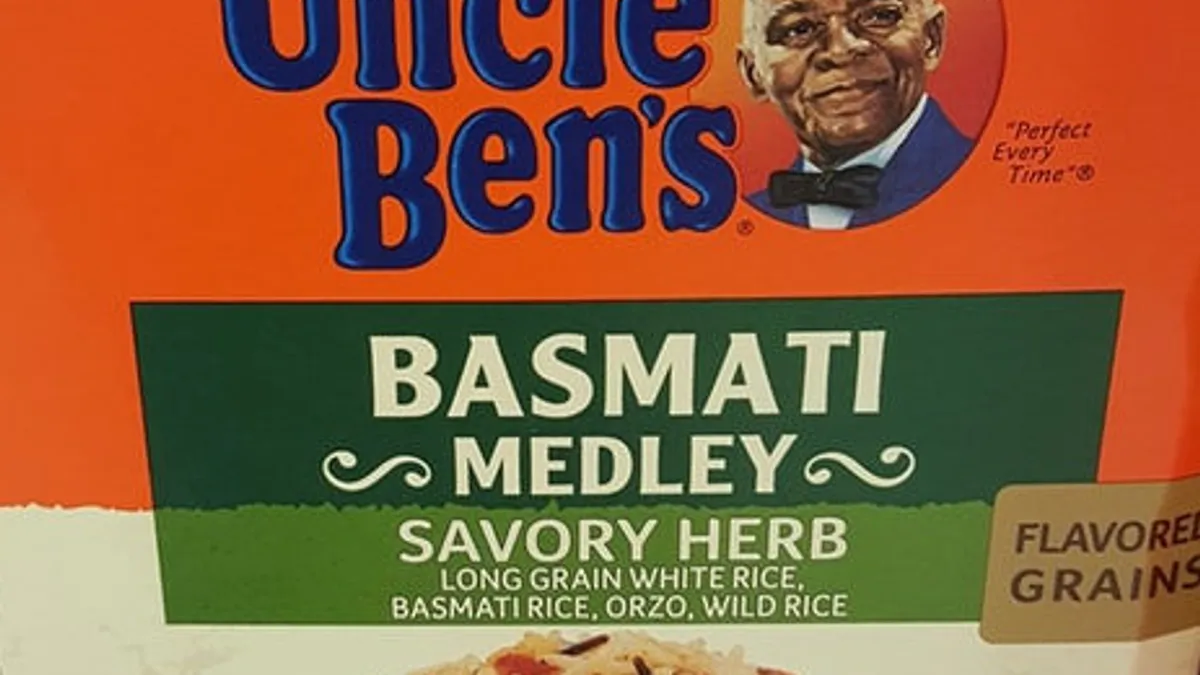Dive Brief:
- Less than a day after PepsiCo announced it would be doing a complete rebrand of its Aunt Jemima products, the Uncle Ben's brand will be undergoing a "brand evolution," according to a statement on the website of its parent company Mars.
- B&G Foods, which owns Cream of Wheat, also said it would be doing an "immediate review" of the breakfast cereal's packaging, which features a picture of a Black chef. "We understand there are concerns regarding the Chef image, and we are committed to evaluating our packaging and will proactively take steps to ensure that we and our brands do not inadvertently contribute to systemic racism," the statement says.
- Conagra Brands also announced it would be doing a "complete brand and packaging review" of its Mrs. Butterworth's brand. "The Mrs. Butterworth's brand, including its syrup packaging, is intended to evoke the images of a loving grandmother," the company said in a statement. "We stand in solidarity with our Black and Brown communities and we can see that our packaging may be interpreted in a way that is wholly inconsistent with our values."
Dive Insight:
As millions of Americans confront longstanding systemic racism and racial biases, they're looking not only at themselves, but also at what they buy. And corporations are taking stock of the images and prejudices they're putting forward through their packaging and marketing campaigns.
Through the years, whenever objections were made to the Black faces on the packaging and marketing campaigns for these brands, the corporate parent companies responded by talking about how beloved the brands are.
Unlike Aunt Jemima, who was invented to sell pancake mix, Uncle Ben was a real person. According to the brand's website, its product was named after a well-known and successful Black rice farmer from Texas. The face on the box is not Ben's, though. It belongs to Frank Brown, a Chicago waiter and chef. Uncle Ben's became the new name for Mars' Converted Brand Rice in 1946. While the former name described exactly what the parboiled rice brand, the clunky name likely didn't stand out on a shelf.
Critics of the name and imagery have also pointed out that Uncle Ben has no last name. Years ago, white Southerners used to refer to older Blacks as "uncles" and "aunts" instead of "Mr." or "Ms." And Uncle Ben wore a bow tie for many years, an image that some said made him look like a hotel porter or someone with another service job.
In 2007, after many food brands did away with branding that was seen as racially insensitive, Mars decided to put Uncle Ben in the spotlight. The New York Times reported the company had done consumer research into the Uncle Ben character and found no negative reactions. Instead, consumers focused on positive imagery and “the legend of Uncle Ben,” Vincent Howell, the president of the Mars division overseeing the brand told the newspaper.
So the company spun a new legend around Uncle Ben, transforming him into a board chairman. On the brand's website, Ben became portrayed as a successful businessman with a well-appointed office, a busy schedule and "grains of wisdom" to share. Howell told The New York Times he found the branding powerful because it showed a Black icon "in a position of prominence and authority. As an African-American, he makes me feel so proud."
The chef on Cream of Wheat packaging was also a real person, though he was not identified as Frank White until the 2000s. White had no ties to the cereal brand, which was created in 1893. According to legend, he was photographed while working in a Chicago restaurant in about 1900 and appeared on the box soon afterward. His name was not formally recorded by the company, but White apparently told people he had been the model.
While much of the imagery on Cream of Wheat boxes and advertising through the years just featured the smiling Black chef, there was an advertisement that dubbed him Rastus, which was a perjorative and generic name for a Black man after the Civil War. The ad, which appears to have a copyright of 1921, shows the chef holding a chalkboard with a poorly written statement about the wholesomeness and value of a bowl of Cream of Wheat.
Mrs. Butterworth's is relatively new to the scene, with the former Pinnacle Foods creating the brand in 1961. Bottles of Mrs. Butterworth's syrup are in the shape of a woman with a long skirt and a bun, and the brand's key marketing campaign has consistently involved consumers having conversations with the bottle. Black actress Thelma "Butterfly" McQueen reportedly was the model for the original Mrs. Butterworth's bottle, but the syrup bottle character has not been portrayed as any particular race. The bottle is dark brown, however — though most syrup bottles are to prevent light damage.
These brand mascots have stayed in place — and even received more prominence — through the years. But change may have brewing even before this moment of elevated consciousness. Sara Schulte, an external communications manager for Mars Food North America said in an email to Adweek that the company has been considering a "more substantive" change for Uncle Ben's, and started that work before the Aunt Jemima announcement.














